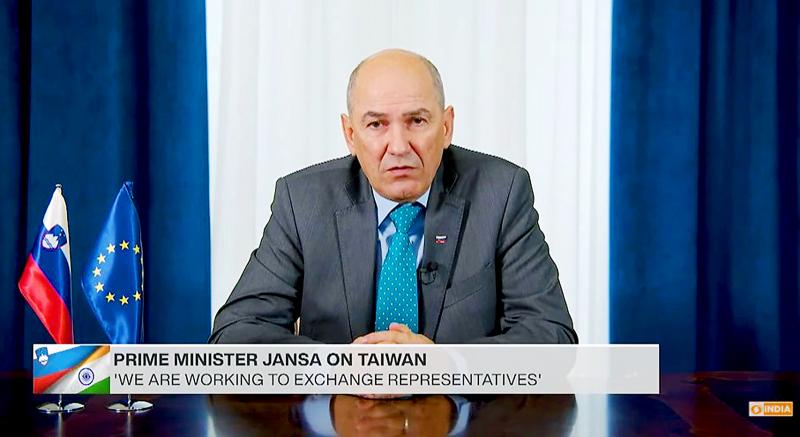The Ministry of Foreign Affairs yesterday welcomed Slovenia’s plan to establish a representative office in Taiwan, after Slovenian Prime Minister Janez Jansa revealed the plan in an interview with Indian TV station Doordarshan on Monday.
Taiwan is a democratic country that respects international democratic standards and international laws, the Slovenian prime minister said in the interview.
Slovenia and Taiwan are working on “exchanging representatives,” he said. “Of course, this will not be on the level of embassies. It will be on the same level as many of the EU member countries.”

Photo: screen grab from Doordarshan
“When I spoke with our businessmen who are trading with Taiwan, they told me that we are trading with Taiwan, but those companies from Taiwan are also trading with mainland China... They are doing this amongst themselves, but at the same time they’re opposing the same relations between Taiwan and other countries, which is ridiculous,” he said.
While the naming of the Taiwanese Representative Office in Lithuania has sparked some criticism in the EU nation, Jansa said that he did not consider it an issue.
“Lithuania is not an exception. There are some slight differences in naming the missions, but this is not important,” he said. “I think that any kind of proceeding pressure on Lithuania and some other countries in Europe will not benefit China’s government. Good trade relations are a common interest.”
After witnessing Taiwan’s disease prevention measures during the COVID-19 pandemic, Jansa said he personally called Minister of Health and Welfare Chen Shih-chung (陳時中) and they spoke via videoconference.
“Actually, we have normal relations with Taiwan,” he said.
Jansa said that he had visited Taiwan four or five times, and that he holds the view that Taiwanese should have the right to determine their future.
“If they want to join China, if it’s their free will without any pressure, without any military intervention and without any blackmailing, without strategic cheating as it is happening in Hong Kong currently, then we will support it. But if Taiwanese people want to live independently, we are here to support also this position,” he said.
“India is a crucial factor here to guarantee the balance of power and with this, the very foundation of possible peaceful solutions,” he added.
Jansa also backed Taiwan’s bid to join the WHO, saying: “I think it would also benefit China to have a neighboring country be a member of such an organization.”
Ministry spokeswoman Joanne Ou (歐江安) yesterday at a news conference in Taipei welcomed the Slovenian government’s plan to open a representative office, adding that the ministry appreciated Jansa’s “insightful” remarks.
“Prime Minister Jansa is a good friend of Taiwan and has visited the nation several times,” she said, thanking him for speaking the truth on international issues.
Taiwan and Slovenia have close economic and trade interactions, while their health ministers have shared their experiences with the pandemic via videoconference, she said.
The government would continue to deepen the nation’s relations with Slovenia and other democratic partners to develop mutually beneficial and resilient partnerships, Ou said.

CHAOS: Iranians took to the streets playing celebratory music after reports of Khamenei’s death on Saturday, while mourners also gathered in Tehran yesterday Iranian Supreme Leader Ayatollah Ali Khamenei was killed in a major attack on Iran launched by Israel and the US, throwing the future of the Islamic republic into doubt and raising the risk of regional instability. Iranian state television and the state-run IRNA news agency announced the 86-year-old’s death early yesterday. US President Donald Trump said it gave Iranians their “greatest chance” to “take back” their country. The announcements came after a joint US and Israeli aerial bombardment that targeted Iranian military and governmental sites. Trump said the “heavy and pinpoint bombing” would continue through the week or as long

TRUST: The KMT said it respected the US’ timing and considerations, and hoped it would continue to honor its commitments to helping Taiwan bolster its defenses and deterrence US President Donald Trump is delaying a multibillion-dollar arms sale to Taiwan to ensure his visit to Beijing is successful, a New York Times report said. The weapons sales package has stalled in the US Department of State, the report said, citing US officials it did not identify. The White House has told agencies not to push forward ahead of Trump’s meeting with Chinese President Xi Jinping (習近平), it said. The two last month held a phone call to discuss trade and geopolitical flashpoints ahead of the summit. Xi raised the Taiwan issue and urged the US to handle arms sales to

BIG SPENDERS: Foreign investors bought the most Taiwan equities since 2005, signaling confidence that an AI boom would continue to benefit chipmakers Taiwan Semiconductor Manufacturing Co’s (TSMC, 台積電) market capitalization swelled to US$2 trillion for the first time following a 4.25 percent rally in its American depositary receipts (ADR) overnight, putting the world’s biggest contract chipmaker sixth on the list of the world’s biggest companies by market capitalization, just behind Amazon.com Inc. The site CompaniesMarketcap.com ranked TSMC ahead of Saudi Aramco and Meta Platforms Inc. The Taiwanese company’s ADRs on Tuesday surged to US$385.75 on the New York Stock Exchange, as strong demand for artificial intelligence (AI) applications led to chip supply constraints and boost revenue growth to record-breaking levels. Each TSMC ADR represents

Pro-democracy media tycoon Jimmy Lai’s (黎智英) fraud conviction and prison sentence were yesterday overturned by a Hong Kong court, in a surprise legal decision that comes soon after Lai was jailed for 20 years on a separate national security charge. Judges Jeremy Poon (潘兆初), Anthea Pang (彭寶琴) and Derek Pang (彭偉昌) said in the judgement that they allowed the appeal from Lai, and another defendant in the case, to proceed, as a lower court judge had “erred.” “The Court of Appeal gave them leave to appeal against their conviction, allowed their appeals, quashed the convictions and set aside the sentences,” the judges